ACFS NSW Logistics: An Intermodal Approach to Overcome Challenges
VerifiedAdded on 2023/06/05
|11
|2919
|429
Report
AI Summary
This report identifies and analyzes the logistic issues faced by ACFS in New South Wales (NSW), focusing on problems related to fuel costs, business process improvement, time and service delivery, customer service, governmental regulations, technology implementation, economic factors, and environmental concerns. The analysis employs logistic theory, emphasizing innovation management and contests, along with an examination of static logistics strategies, automation adoption, warehouse management, and efficient transportation. The report also highlights the features of intermodal transportation, government support, and regulations impacting ACFS's supply chain management. Recommendations include exploring alternative fuel sources, implementing business process improvements through intermodal systems, upgrading technology, and ensuring timely service delivery. The study concludes by advocating for a proactive approach to address these challenges and enhance ACFS's logistic operations in NSW. Desklib provides access to similar solved assignments and study resources for students.

INTERNATIONAL INTERMODALS / HUBS
Paraphrase This Document
Need a fresh take? Get an instant paraphrase of this document with our AI Paraphraser

Table of Contents
Introduction................................................................................................................................3
Findings......................................................................................................................................3
Analysis......................................................................................................................................5
Recommendation........................................................................................................................8
Conclusion..................................................................................................................................8
Reference list..............................................................................................................................9
Introduction................................................................................................................................3
Findings......................................................................................................................................3
Analysis......................................................................................................................................5
Recommendation........................................................................................................................8
Conclusion..................................................................................................................................8
Reference list..............................................................................................................................9
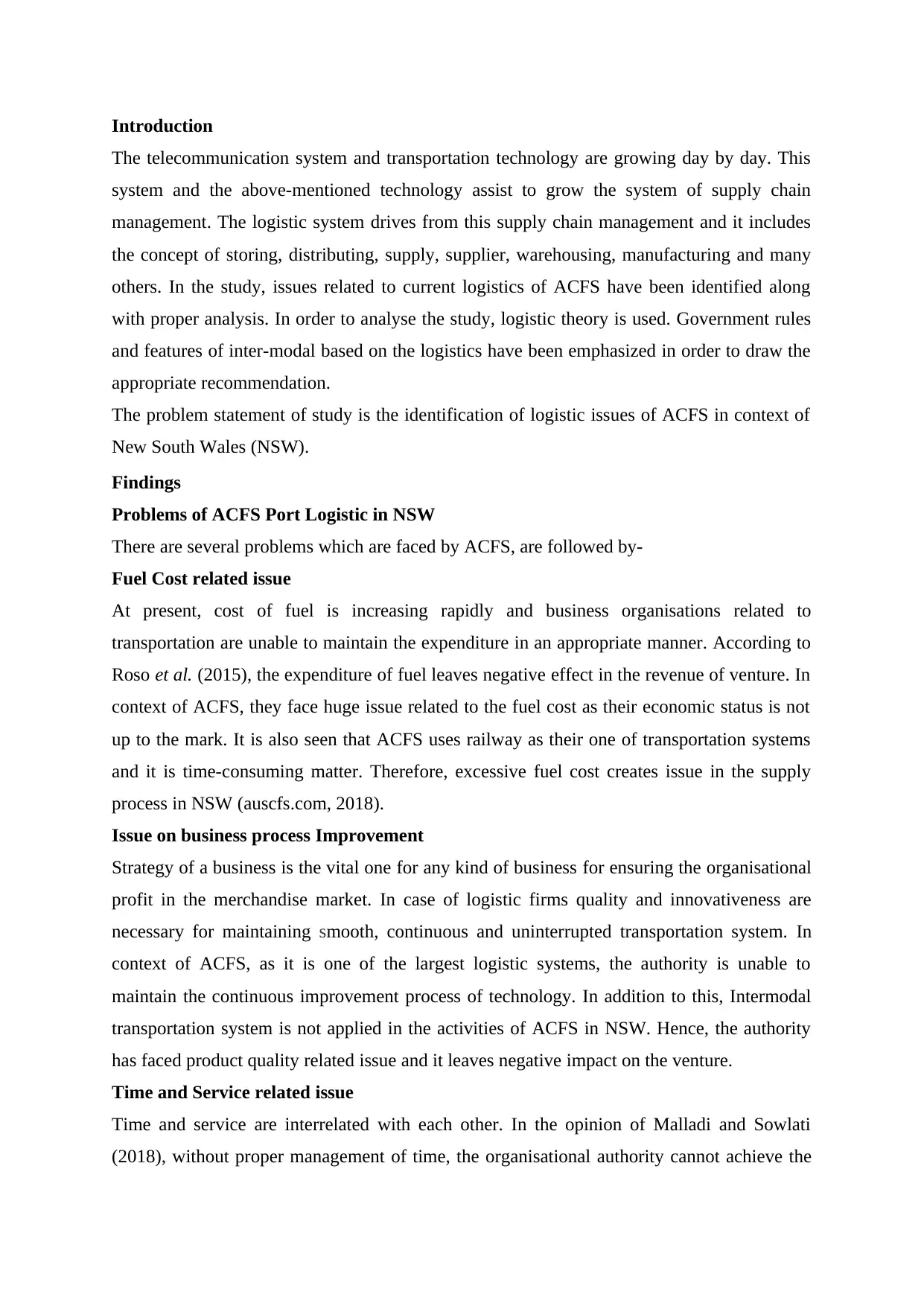
Introduction
The telecommunication system and transportation technology are growing day by day. This
system and the above-mentioned technology assist to grow the system of supply chain
management. The logistic system drives from this supply chain management and it includes
the concept of storing, distributing, supply, supplier, warehousing, manufacturing and many
others. In the study, issues related to current logistics of ACFS have been identified along
with proper analysis. In order to analyse the study, logistic theory is used. Government rules
and features of inter-modal based on the logistics have been emphasized in order to draw the
appropriate recommendation.
The problem statement of study is the identification of logistic issues of ACFS in context of
New South Wales (NSW).
Findings
Problems of ACFS Port Logistic in NSW
There are several problems which are faced by ACFS, are followed by-
Fuel Cost related issue
At present, cost of fuel is increasing rapidly and business organisations related to
transportation are unable to maintain the expenditure in an appropriate manner. According to
Roso et al. (2015), the expenditure of fuel leaves negative effect in the revenue of venture. In
context of ACFS, they face huge issue related to the fuel cost as their economic status is not
up to the mark. It is also seen that ACFS uses railway as their one of transportation systems
and it is time-consuming matter. Therefore, excessive fuel cost creates issue in the supply
process in NSW (auscfs.com, 2018).
Issue on business process Improvement
Strategy of a business is the vital one for any kind of business for ensuring the organisational
profit in the merchandise market. In case of logistic firms quality and innovativeness are
necessary for maintaining smooth, continuous and uninterrupted transportation system. In
context of ACFS, as it is one of the largest logistic systems, the authority is unable to
maintain the continuous improvement process of technology. In addition to this, Intermodal
transportation system is not applied in the activities of ACFS in NSW. Hence, the authority
has faced product quality related issue and it leaves negative impact on the venture.
Time and Service related issue
Time and service are interrelated with each other. In the opinion of Malladi and Sowlati
(2018), without proper management of time, the organisational authority cannot achieve the
The telecommunication system and transportation technology are growing day by day. This
system and the above-mentioned technology assist to grow the system of supply chain
management. The logistic system drives from this supply chain management and it includes
the concept of storing, distributing, supply, supplier, warehousing, manufacturing and many
others. In the study, issues related to current logistics of ACFS have been identified along
with proper analysis. In order to analyse the study, logistic theory is used. Government rules
and features of inter-modal based on the logistics have been emphasized in order to draw the
appropriate recommendation.
The problem statement of study is the identification of logistic issues of ACFS in context of
New South Wales (NSW).
Findings
Problems of ACFS Port Logistic in NSW
There are several problems which are faced by ACFS, are followed by-
Fuel Cost related issue
At present, cost of fuel is increasing rapidly and business organisations related to
transportation are unable to maintain the expenditure in an appropriate manner. According to
Roso et al. (2015), the expenditure of fuel leaves negative effect in the revenue of venture. In
context of ACFS, they face huge issue related to the fuel cost as their economic status is not
up to the mark. It is also seen that ACFS uses railway as their one of transportation systems
and it is time-consuming matter. Therefore, excessive fuel cost creates issue in the supply
process in NSW (auscfs.com, 2018).
Issue on business process Improvement
Strategy of a business is the vital one for any kind of business for ensuring the organisational
profit in the merchandise market. In case of logistic firms quality and innovativeness are
necessary for maintaining smooth, continuous and uninterrupted transportation system. In
context of ACFS, as it is one of the largest logistic systems, the authority is unable to
maintain the continuous improvement process of technology. In addition to this, Intermodal
transportation system is not applied in the activities of ACFS in NSW. Hence, the authority
has faced product quality related issue and it leaves negative impact on the venture.
Time and Service related issue
Time and service are interrelated with each other. In the opinion of Malladi and Sowlati
(2018), without proper management of time, the organisational authority cannot achieve the
⊘ This is a preview!⊘
Do you want full access?
Subscribe today to unlock all pages.

Trusted by 1+ million students worldwide
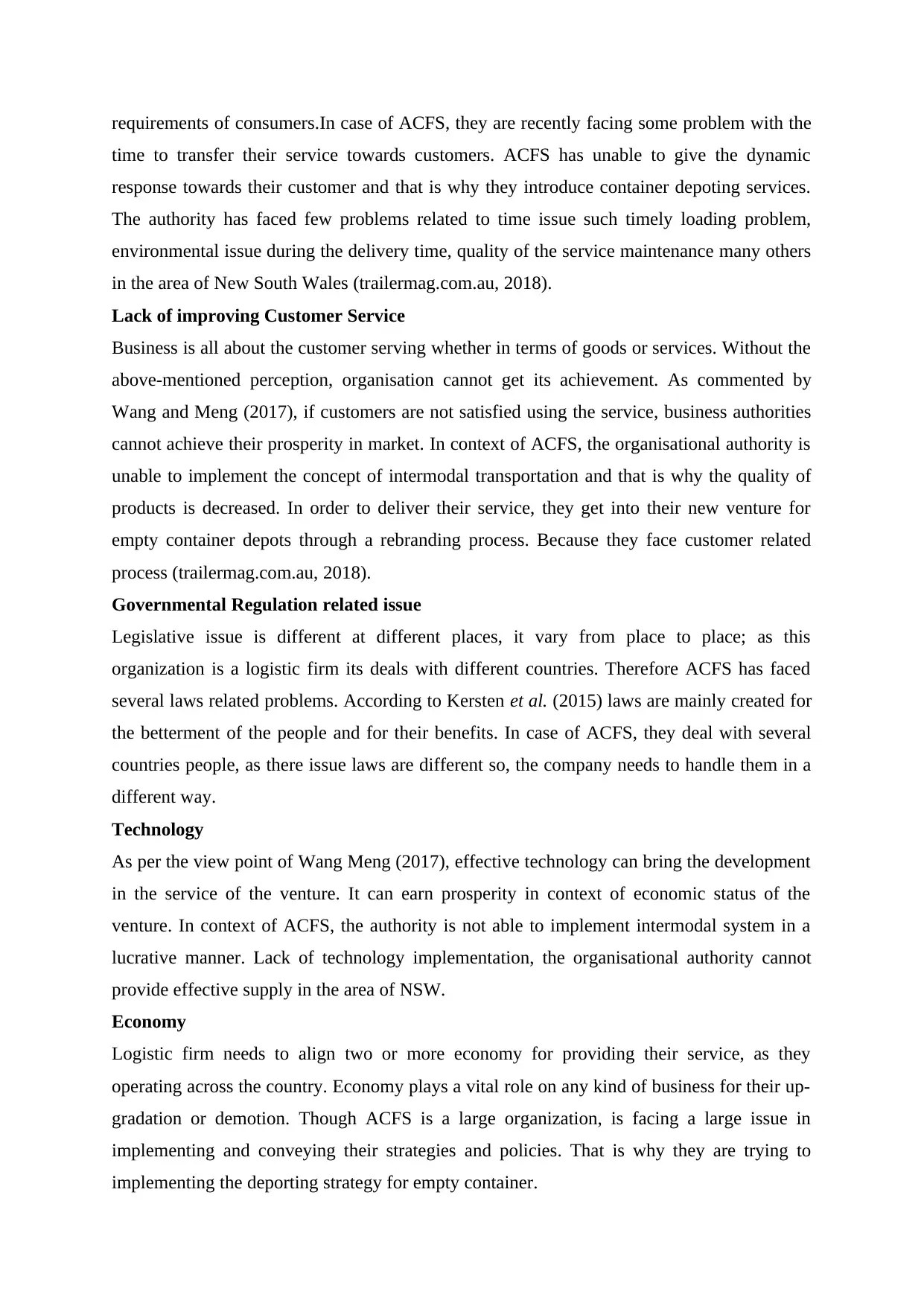
requirements of consumers.In case of ACFS, they are recently facing some problem with the
time to transfer their service towards customers. ACFS has unable to give the dynamic
response towards their customer and that is why they introduce container depoting services.
The authority has faced few problems related to time issue such timely loading problem,
environmental issue during the delivery time, quality of the service maintenance many others
in the area of New South Wales (trailermag.com.au, 2018).
Lack of improving Customer Service
Business is all about the customer serving whether in terms of goods or services. Without the
above-mentioned perception, organisation cannot get its achievement. As commented by
Wang and Meng (2017), if customers are not satisfied using the service, business authorities
cannot achieve their prosperity in market. In context of ACFS, the organisational authority is
unable to implement the concept of intermodal transportation and that is why the quality of
products is decreased. In order to deliver their service, they get into their new venture for
empty container depots through a rebranding process. Because they face customer related
process (trailermag.com.au, 2018).
Governmental Regulation related issue
Legislative issue is different at different places, it vary from place to place; as this
organization is a logistic firm its deals with different countries. Therefore ACFS has faced
several laws related problems. According to Kersten et al. (2015) laws are mainly created for
the betterment of the people and for their benefits. In case of ACFS, they deal with several
countries people, as there issue laws are different so, the company needs to handle them in a
different way.
Technology
As per the view point of Wang Meng (2017), effective technology can bring the development
in the service of the venture. It can earn prosperity in context of economic status of the
venture. In context of ACFS, the authority is not able to implement intermodal system in a
lucrative manner. Lack of technology implementation, the organisational authority cannot
provide effective supply in the area of NSW.
Economy
Logistic firm needs to align two or more economy for providing their service, as they
operating across the country. Economy plays a vital role on any kind of business for their up-
gradation or demotion. Though ACFS is a large organization, is facing a large issue in
implementing and conveying their strategies and policies. That is why they are trying to
implementing the deporting strategy for empty container.
time to transfer their service towards customers. ACFS has unable to give the dynamic
response towards their customer and that is why they introduce container depoting services.
The authority has faced few problems related to time issue such timely loading problem,
environmental issue during the delivery time, quality of the service maintenance many others
in the area of New South Wales (trailermag.com.au, 2018).
Lack of improving Customer Service
Business is all about the customer serving whether in terms of goods or services. Without the
above-mentioned perception, organisation cannot get its achievement. As commented by
Wang and Meng (2017), if customers are not satisfied using the service, business authorities
cannot achieve their prosperity in market. In context of ACFS, the organisational authority is
unable to implement the concept of intermodal transportation and that is why the quality of
products is decreased. In order to deliver their service, they get into their new venture for
empty container depots through a rebranding process. Because they face customer related
process (trailermag.com.au, 2018).
Governmental Regulation related issue
Legislative issue is different at different places, it vary from place to place; as this
organization is a logistic firm its deals with different countries. Therefore ACFS has faced
several laws related problems. According to Kersten et al. (2015) laws are mainly created for
the betterment of the people and for their benefits. In case of ACFS, they deal with several
countries people, as there issue laws are different so, the company needs to handle them in a
different way.
Technology
As per the view point of Wang Meng (2017), effective technology can bring the development
in the service of the venture. It can earn prosperity in context of economic status of the
venture. In context of ACFS, the authority is not able to implement intermodal system in a
lucrative manner. Lack of technology implementation, the organisational authority cannot
provide effective supply in the area of NSW.
Economy
Logistic firm needs to align two or more economy for providing their service, as they
operating across the country. Economy plays a vital role on any kind of business for their up-
gradation or demotion. Though ACFS is a large organization, is facing a large issue in
implementing and conveying their strategies and policies. That is why they are trying to
implementing the deporting strategy for empty container.
Paraphrase This Document
Need a fresh take? Get an instant paraphrase of this document with our AI Paraphraser
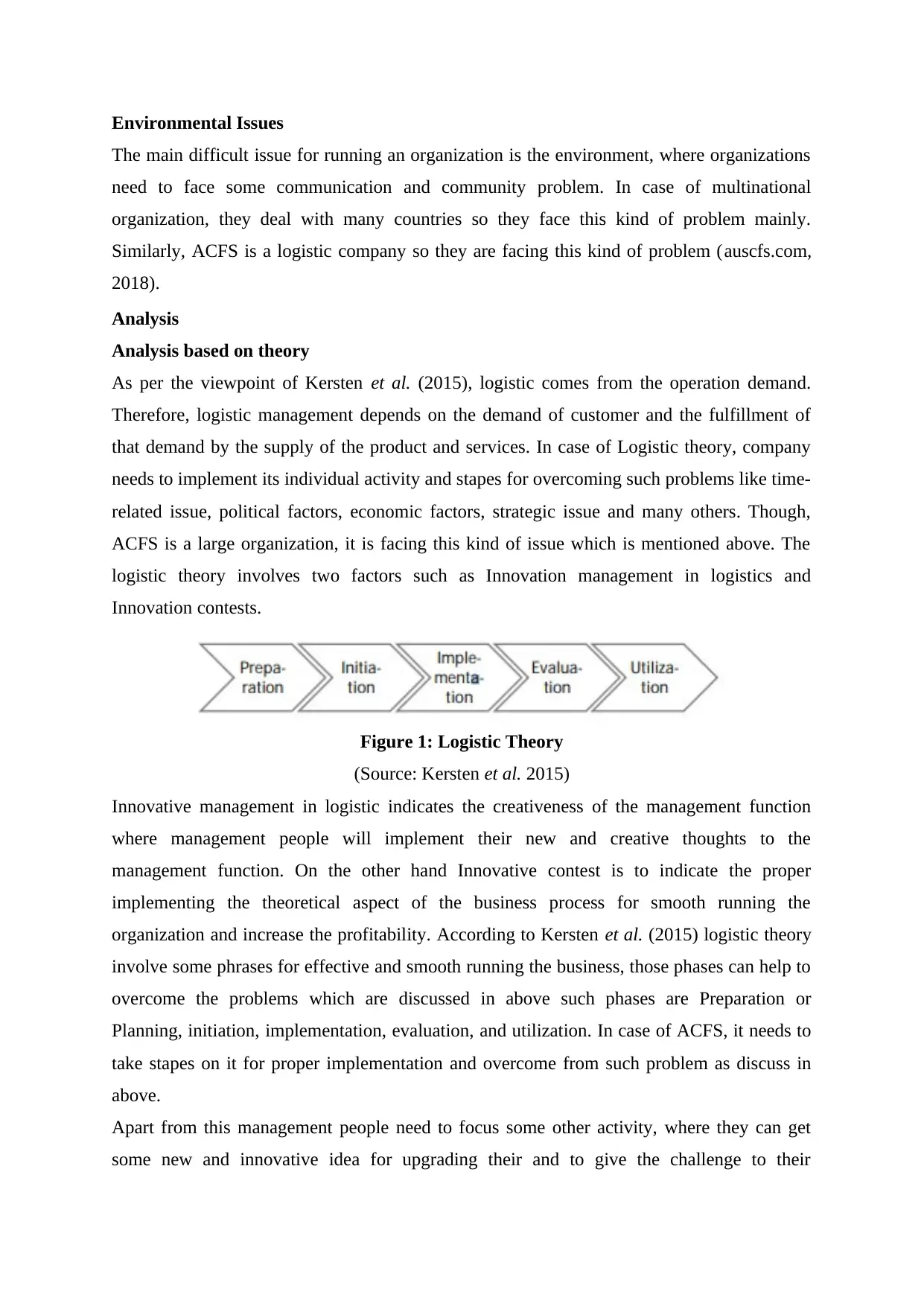
Environmental Issues
The main difficult issue for running an organization is the environment, where organizations
need to face some communication and community problem. In case of multinational
organization, they deal with many countries so they face this kind of problem mainly.
Similarly, ACFS is a logistic company so they are facing this kind of problem (auscfs.com,
2018).
Analysis
Analysis based on theory
As per the viewpoint of Kersten et al. (2015), logistic comes from the operation demand.
Therefore, logistic management depends on the demand of customer and the fulfillment of
that demand by the supply of the product and services. In case of Logistic theory, company
needs to implement its individual activity and stapes for overcoming such problems like time-
related issue, political factors, economic factors, strategic issue and many others. Though,
ACFS is a large organization, it is facing this kind of issue which is mentioned above. The
logistic theory involves two factors such as Innovation management in logistics and
Innovation contests.
Figure 1: Logistic Theory
(Source: Kersten et al. 2015)
Innovative management in logistic indicates the creativeness of the management function
where management people will implement their new and creative thoughts to the
management function. On the other hand Innovative contest is to indicate the proper
implementing the theoretical aspect of the business process for smooth running the
organization and increase the profitability. According to Kersten et al. (2015) logistic theory
involve some phrases for effective and smooth running the business, those phases can help to
overcome the problems which are discussed in above such phases are Preparation or
Planning, initiation, implementation, evaluation, and utilization. In case of ACFS, it needs to
take stapes on it for proper implementation and overcome from such problem as discuss in
above.
Apart from this management people need to focus some other activity, where they can get
some new and innovative idea for upgrading their and to give the challenge to their
The main difficult issue for running an organization is the environment, where organizations
need to face some communication and community problem. In case of multinational
organization, they deal with many countries so they face this kind of problem mainly.
Similarly, ACFS is a logistic company so they are facing this kind of problem (auscfs.com,
2018).
Analysis
Analysis based on theory
As per the viewpoint of Kersten et al. (2015), logistic comes from the operation demand.
Therefore, logistic management depends on the demand of customer and the fulfillment of
that demand by the supply of the product and services. In case of Logistic theory, company
needs to implement its individual activity and stapes for overcoming such problems like time-
related issue, political factors, economic factors, strategic issue and many others. Though,
ACFS is a large organization, it is facing this kind of issue which is mentioned above. The
logistic theory involves two factors such as Innovation management in logistics and
Innovation contests.
Figure 1: Logistic Theory
(Source: Kersten et al. 2015)
Innovative management in logistic indicates the creativeness of the management function
where management people will implement their new and creative thoughts to the
management function. On the other hand Innovative contest is to indicate the proper
implementing the theoretical aspect of the business process for smooth running the
organization and increase the profitability. According to Kersten et al. (2015) logistic theory
involve some phrases for effective and smooth running the business, those phases can help to
overcome the problems which are discussed in above such phases are Preparation or
Planning, initiation, implementation, evaluation, and utilization. In case of ACFS, it needs to
take stapes on it for proper implementation and overcome from such problem as discuss in
above.
Apart from this management people need to focus some other activity, where they can get
some new and innovative idea for upgrading their and to give the challenge to their
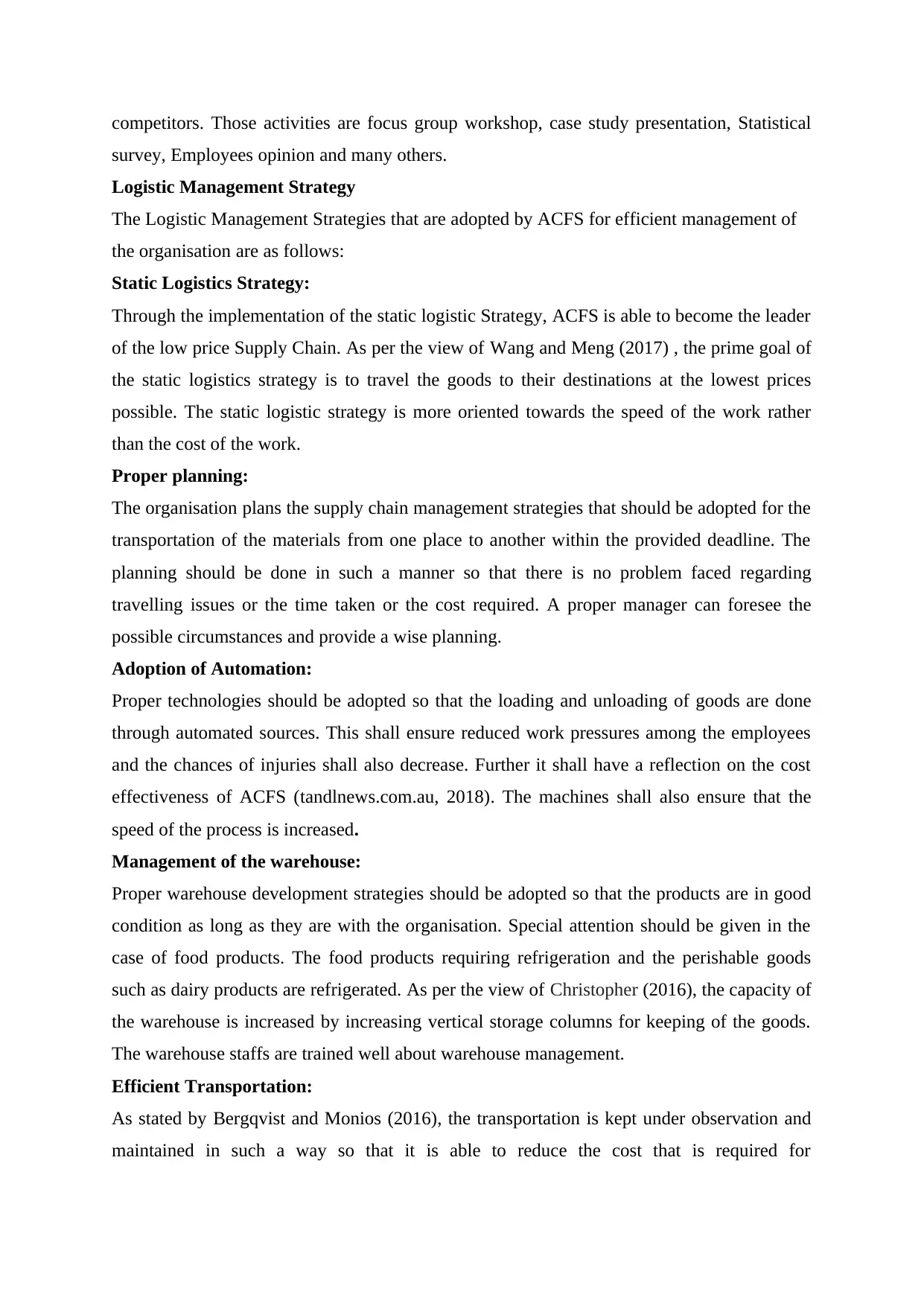
competitors. Those activities are focus group workshop, case study presentation, Statistical
survey, Employees opinion and many others.
Logistic Management Strategy
The Logistic Management Strategies that are adopted by ACFS for efficient management of
the organisation are as follows:
Static Logistics Strategy:
Through the implementation of the static logistic Strategy, ACFS is able to become the leader
of the low price Supply Chain. As per the view of Wang and Meng (2017) , the prime goal of
the static logistics strategy is to travel the goods to their destinations at the lowest prices
possible. The static logistic strategy is more oriented towards the speed of the work rather
than the cost of the work.
Proper planning:
The organisation plans the supply chain management strategies that should be adopted for the
transportation of the materials from one place to another within the provided deadline. The
planning should be done in such a manner so that there is no problem faced regarding
travelling issues or the time taken or the cost required. A proper manager can foresee the
possible circumstances and provide a wise planning.
Adoption of Automation:
Proper technologies should be adopted so that the loading and unloading of goods are done
through automated sources. This shall ensure reduced work pressures among the employees
and the chances of injuries shall also decrease. Further it shall have a reflection on the cost
effectiveness of ACFS (tandlnews.com.au, 2018). The machines shall also ensure that the
speed of the process is increased.
Management of the warehouse:
Proper warehouse development strategies should be adopted so that the products are in good
condition as long as they are with the organisation. Special attention should be given in the
case of food products. The food products requiring refrigeration and the perishable goods
such as dairy products are refrigerated. As per the view of Christopher (2016), the capacity of
the warehouse is increased by increasing vertical storage columns for keeping of the goods.
The warehouse staffs are trained well about warehouse management.
Efficient Transportation:
As stated by Bergqvist and Monios (2016), the transportation is kept under observation and
maintained in such a way so that it is able to reduce the cost that is required for
survey, Employees opinion and many others.
Logistic Management Strategy
The Logistic Management Strategies that are adopted by ACFS for efficient management of
the organisation are as follows:
Static Logistics Strategy:
Through the implementation of the static logistic Strategy, ACFS is able to become the leader
of the low price Supply Chain. As per the view of Wang and Meng (2017) , the prime goal of
the static logistics strategy is to travel the goods to their destinations at the lowest prices
possible. The static logistic strategy is more oriented towards the speed of the work rather
than the cost of the work.
Proper planning:
The organisation plans the supply chain management strategies that should be adopted for the
transportation of the materials from one place to another within the provided deadline. The
planning should be done in such a manner so that there is no problem faced regarding
travelling issues or the time taken or the cost required. A proper manager can foresee the
possible circumstances and provide a wise planning.
Adoption of Automation:
Proper technologies should be adopted so that the loading and unloading of goods are done
through automated sources. This shall ensure reduced work pressures among the employees
and the chances of injuries shall also decrease. Further it shall have a reflection on the cost
effectiveness of ACFS (tandlnews.com.au, 2018). The machines shall also ensure that the
speed of the process is increased.
Management of the warehouse:
Proper warehouse development strategies should be adopted so that the products are in good
condition as long as they are with the organisation. Special attention should be given in the
case of food products. The food products requiring refrigeration and the perishable goods
such as dairy products are refrigerated. As per the view of Christopher (2016), the capacity of
the warehouse is increased by increasing vertical storage columns for keeping of the goods.
The warehouse staffs are trained well about warehouse management.
Efficient Transportation:
As stated by Bergqvist and Monios (2016), the transportation is kept under observation and
maintained in such a way so that it is able to reduce the cost that is required for
⊘ This is a preview!⊘
Do you want full access?
Subscribe today to unlock all pages.

Trusted by 1+ million students worldwide
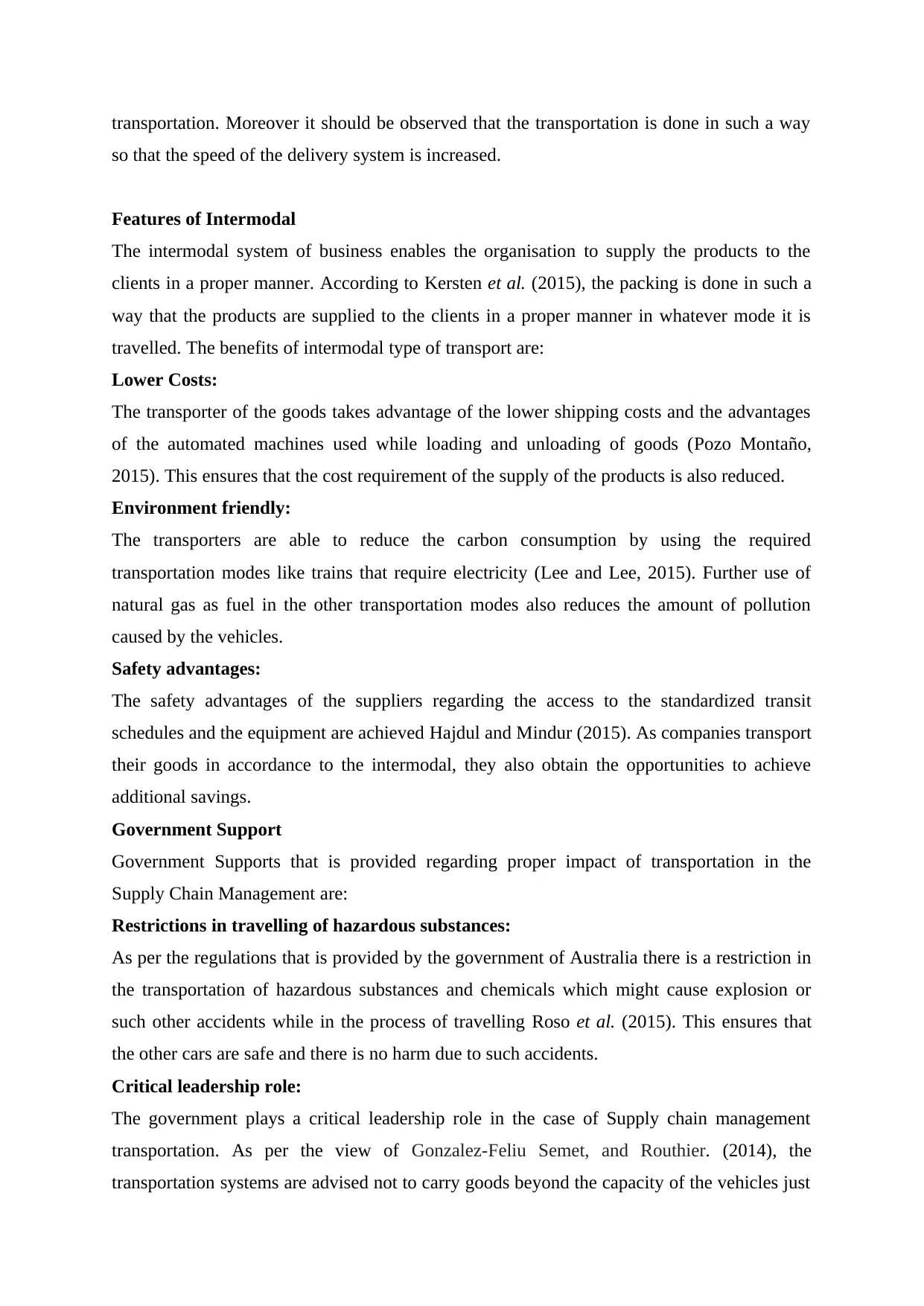
transportation. Moreover it should be observed that the transportation is done in such a way
so that the speed of the delivery system is increased.
Features of Intermodal
The intermodal system of business enables the organisation to supply the products to the
clients in a proper manner. According to Kersten et al. (2015), the packing is done in such a
way that the products are supplied to the clients in a proper manner in whatever mode it is
travelled. The benefits of intermodal type of transport are:
Lower Costs:
The transporter of the goods takes advantage of the lower shipping costs and the advantages
of the automated machines used while loading and unloading of goods (Pozo Montaño,
2015). This ensures that the cost requirement of the supply of the products is also reduced.
Environment friendly:
The transporters are able to reduce the carbon consumption by using the required
transportation modes like trains that require electricity (Lee and Lee, 2015). Further use of
natural gas as fuel in the other transportation modes also reduces the amount of pollution
caused by the vehicles.
Safety advantages:
The safety advantages of the suppliers regarding the access to the standardized transit
schedules and the equipment are achieved Hajdul and Mindur (2015). As companies transport
their goods in accordance to the intermodal, they also obtain the opportunities to achieve
additional savings.
Government Support
Government Supports that is provided regarding proper impact of transportation in the
Supply Chain Management are:
Restrictions in travelling of hazardous substances:
As per the regulations that is provided by the government of Australia there is a restriction in
the transportation of hazardous substances and chemicals which might cause explosion or
such other accidents while in the process of travelling Roso et al. (2015). This ensures that
the other cars are safe and there is no harm due to such accidents.
Critical leadership role:
The government plays a critical leadership role in the case of Supply chain management
transportation. As per the view of Gonzalez-Feliu Semet, and Routhier. (2014), the
transportation systems are advised not to carry goods beyond the capacity of the vehicles just
so that the speed of the delivery system is increased.
Features of Intermodal
The intermodal system of business enables the organisation to supply the products to the
clients in a proper manner. According to Kersten et al. (2015), the packing is done in such a
way that the products are supplied to the clients in a proper manner in whatever mode it is
travelled. The benefits of intermodal type of transport are:
Lower Costs:
The transporter of the goods takes advantage of the lower shipping costs and the advantages
of the automated machines used while loading and unloading of goods (Pozo Montaño,
2015). This ensures that the cost requirement of the supply of the products is also reduced.
Environment friendly:
The transporters are able to reduce the carbon consumption by using the required
transportation modes like trains that require electricity (Lee and Lee, 2015). Further use of
natural gas as fuel in the other transportation modes also reduces the amount of pollution
caused by the vehicles.
Safety advantages:
The safety advantages of the suppliers regarding the access to the standardized transit
schedules and the equipment are achieved Hajdul and Mindur (2015). As companies transport
their goods in accordance to the intermodal, they also obtain the opportunities to achieve
additional savings.
Government Support
Government Supports that is provided regarding proper impact of transportation in the
Supply Chain Management are:
Restrictions in travelling of hazardous substances:
As per the regulations that is provided by the government of Australia there is a restriction in
the transportation of hazardous substances and chemicals which might cause explosion or
such other accidents while in the process of travelling Roso et al. (2015). This ensures that
the other cars are safe and there is no harm due to such accidents.
Critical leadership role:
The government plays a critical leadership role in the case of Supply chain management
transportation. As per the view of Gonzalez-Feliu Semet, and Routhier. (2014), the
transportation systems are advised not to carry goods beyond the capacity of the vehicles just
Paraphrase This Document
Need a fresh take? Get an instant paraphrase of this document with our AI Paraphraser
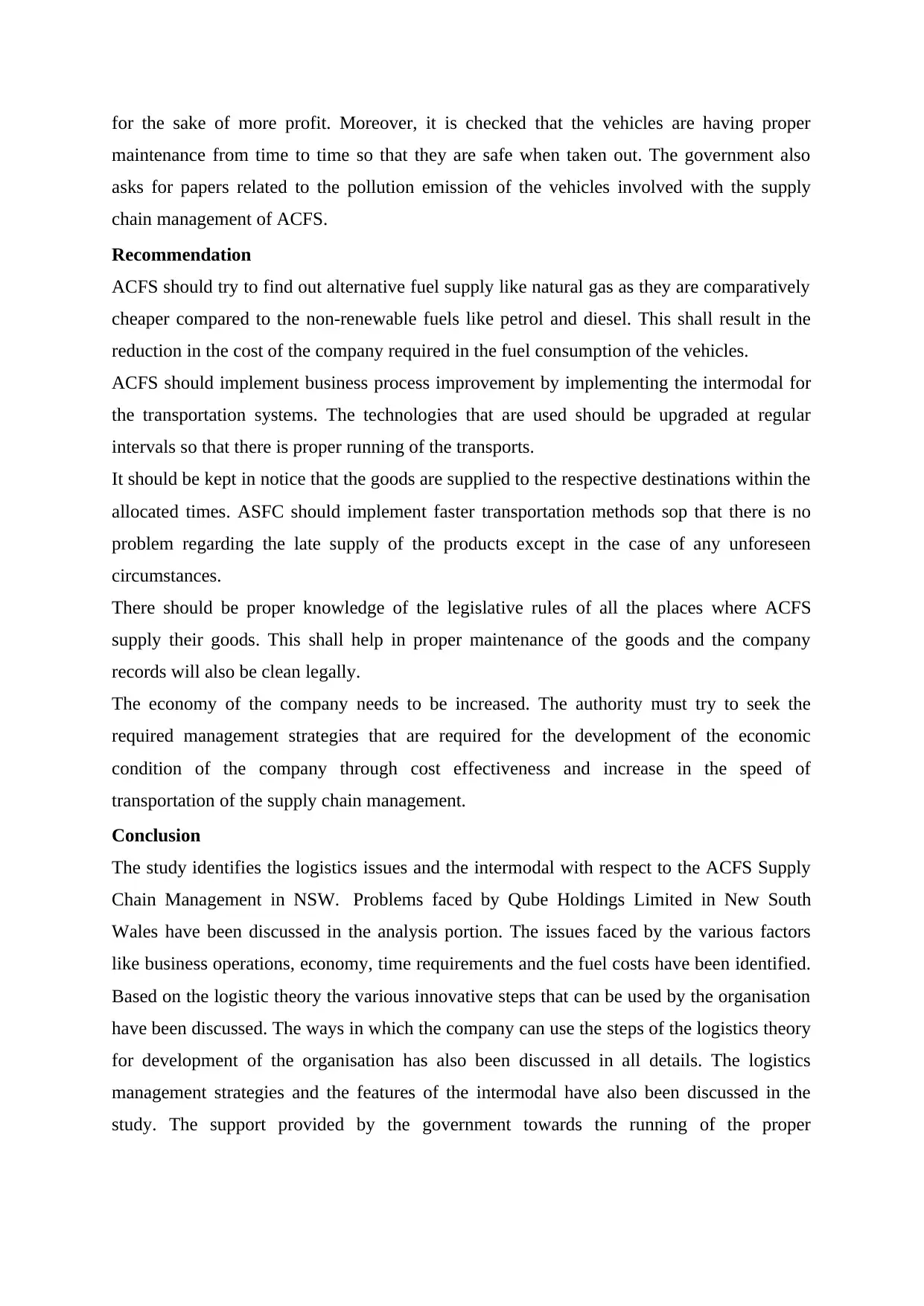
for the sake of more profit. Moreover, it is checked that the vehicles are having proper
maintenance from time to time so that they are safe when taken out. The government also
asks for papers related to the pollution emission of the vehicles involved with the supply
chain management of ACFS.
Recommendation
ACFS should try to find out alternative fuel supply like natural gas as they are comparatively
cheaper compared to the non-renewable fuels like petrol and diesel. This shall result in the
reduction in the cost of the company required in the fuel consumption of the vehicles.
ACFS should implement business process improvement by implementing the intermodal for
the transportation systems. The technologies that are used should be upgraded at regular
intervals so that there is proper running of the transports.
It should be kept in notice that the goods are supplied to the respective destinations within the
allocated times. ASFC should implement faster transportation methods sop that there is no
problem regarding the late supply of the products except in the case of any unforeseen
circumstances.
There should be proper knowledge of the legislative rules of all the places where ACFS
supply their goods. This shall help in proper maintenance of the goods and the company
records will also be clean legally.
The economy of the company needs to be increased. The authority must try to seek the
required management strategies that are required for the development of the economic
condition of the company through cost effectiveness and increase in the speed of
transportation of the supply chain management.
Conclusion
The study identifies the logistics issues and the intermodal with respect to the ACFS Supply
Chain Management in NSW. Problems faced by Qube Holdings Limited in New South
Wales have been discussed in the analysis portion. The issues faced by the various factors
like business operations, economy, time requirements and the fuel costs have been identified.
Based on the logistic theory the various innovative steps that can be used by the organisation
have been discussed. The ways in which the company can use the steps of the logistics theory
for development of the organisation has also been discussed in all details. The logistics
management strategies and the features of the intermodal have also been discussed in the
study. The support provided by the government towards the running of the proper
maintenance from time to time so that they are safe when taken out. The government also
asks for papers related to the pollution emission of the vehicles involved with the supply
chain management of ACFS.
Recommendation
ACFS should try to find out alternative fuel supply like natural gas as they are comparatively
cheaper compared to the non-renewable fuels like petrol and diesel. This shall result in the
reduction in the cost of the company required in the fuel consumption of the vehicles.
ACFS should implement business process improvement by implementing the intermodal for
the transportation systems. The technologies that are used should be upgraded at regular
intervals so that there is proper running of the transports.
It should be kept in notice that the goods are supplied to the respective destinations within the
allocated times. ASFC should implement faster transportation methods sop that there is no
problem regarding the late supply of the products except in the case of any unforeseen
circumstances.
There should be proper knowledge of the legislative rules of all the places where ACFS
supply their goods. This shall help in proper maintenance of the goods and the company
records will also be clean legally.
The economy of the company needs to be increased. The authority must try to seek the
required management strategies that are required for the development of the economic
condition of the company through cost effectiveness and increase in the speed of
transportation of the supply chain management.
Conclusion
The study identifies the logistics issues and the intermodal with respect to the ACFS Supply
Chain Management in NSW. Problems faced by Qube Holdings Limited in New South
Wales have been discussed in the analysis portion. The issues faced by the various factors
like business operations, economy, time requirements and the fuel costs have been identified.
Based on the logistic theory the various innovative steps that can be used by the organisation
have been discussed. The ways in which the company can use the steps of the logistics theory
for development of the organisation has also been discussed in all details. The logistics
management strategies and the features of the intermodal have also been discussed in the
study. The support provided by the government towards the running of the proper

transportation system has also been discussed. Recommendations based on the issues faced in
the beginning of the study have also been provided.
the beginning of the study have also been provided.
⊘ This is a preview!⊘
Do you want full access?
Subscribe today to unlock all pages.

Trusted by 1+ million students worldwide
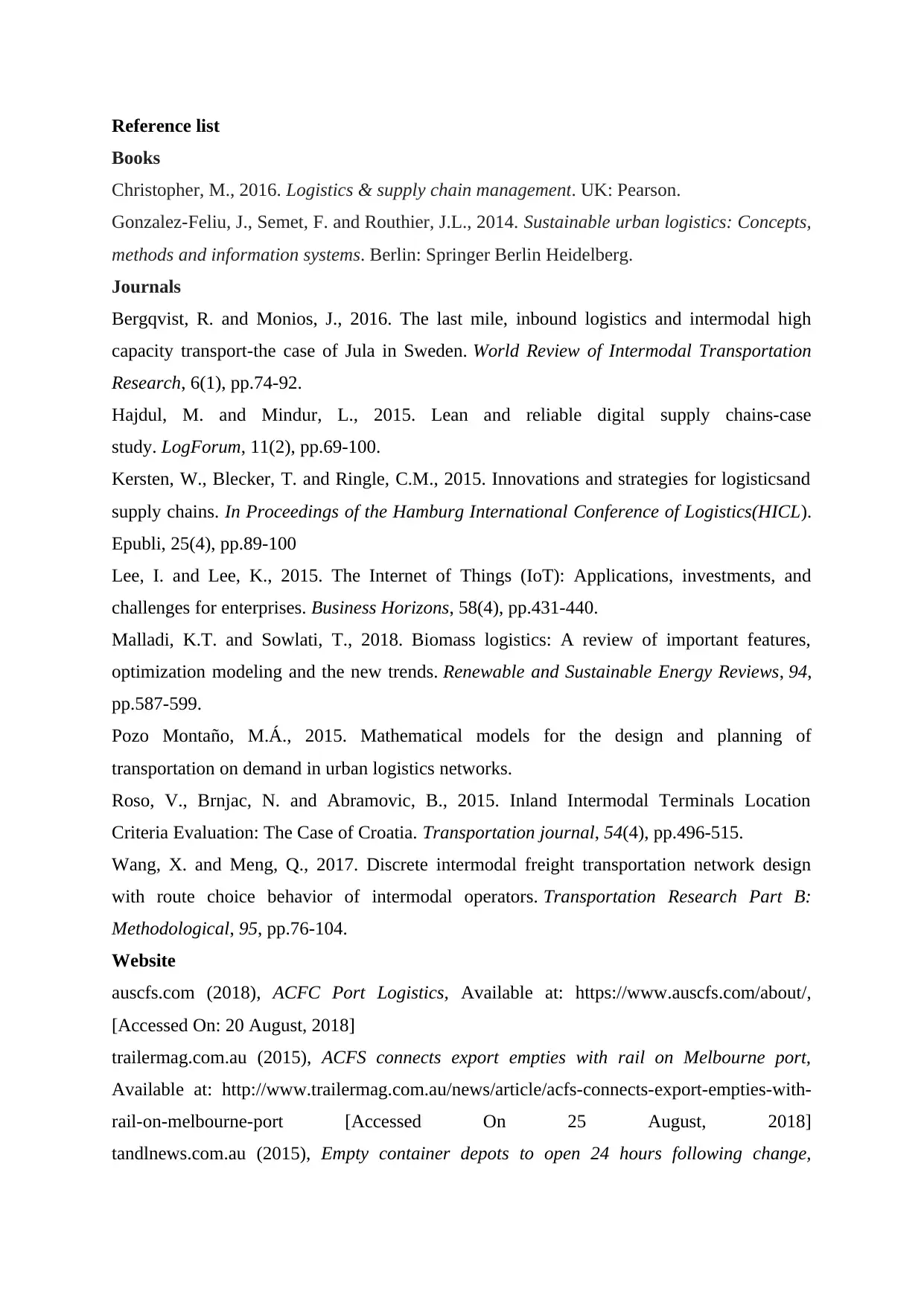
Reference list
Books
Christopher, M., 2016. Logistics & supply chain management. UK: Pearson.
Gonzalez-Feliu, J., Semet, F. and Routhier, J.L., 2014. Sustainable urban logistics: Concepts,
methods and information systems. Berlin: Springer Berlin Heidelberg.
Journals
Bergqvist, R. and Monios, J., 2016. The last mile, inbound logistics and intermodal high
capacity transport-the case of Jula in Sweden. World Review of Intermodal Transportation
Research, 6(1), pp.74-92.
Hajdul, M. and Mindur, L., 2015. Lean and reliable digital supply chains-case
study. LogForum, 11(2), pp.69-100.
Kersten, W., Blecker, T. and Ringle, C.M., 2015. Innovations and strategies for logisticsand
supply chains. In Proceedings of the Hamburg International Conference of Logistics(HICL).
Epubli, 25(4), pp.89-100
Lee, I. and Lee, K., 2015. The Internet of Things (IoT): Applications, investments, and
challenges for enterprises. Business Horizons, 58(4), pp.431-440.
Malladi, K.T. and Sowlati, T., 2018. Biomass logistics: A review of important features,
optimization modeling and the new trends. Renewable and Sustainable Energy Reviews, 94,
pp.587-599.
Pozo Montaño, M.Á., 2015. Mathematical models for the design and planning of
transportation on demand in urban logistics networks.
Roso, V., Brnjac, N. and Abramovic, B., 2015. Inland Intermodal Terminals Location
Criteria Evaluation: The Case of Croatia. Transportation journal, 54(4), pp.496-515.
Wang, X. and Meng, Q., 2017. Discrete intermodal freight transportation network design
with route choice behavior of intermodal operators. Transportation Research Part B:
Methodological, 95, pp.76-104.
Website
auscfs.com (2018), ACFC Port Logistics, Available at: https://www.auscfs.com/about/,
[Accessed On: 20 August, 2018]
trailermag.com.au (2015), ACFS connects export empties with rail on Melbourne port,
Available at: http://www.trailermag.com.au/news/article/acfs-connects-export-empties-with-
rail-on-melbourne-port [Accessed On 25 August, 2018]
tandlnews.com.au (2015), Empty container depots to open 24 hours following change,
Books
Christopher, M., 2016. Logistics & supply chain management. UK: Pearson.
Gonzalez-Feliu, J., Semet, F. and Routhier, J.L., 2014. Sustainable urban logistics: Concepts,
methods and information systems. Berlin: Springer Berlin Heidelberg.
Journals
Bergqvist, R. and Monios, J., 2016. The last mile, inbound logistics and intermodal high
capacity transport-the case of Jula in Sweden. World Review of Intermodal Transportation
Research, 6(1), pp.74-92.
Hajdul, M. and Mindur, L., 2015. Lean and reliable digital supply chains-case
study. LogForum, 11(2), pp.69-100.
Kersten, W., Blecker, T. and Ringle, C.M., 2015. Innovations and strategies for logisticsand
supply chains. In Proceedings of the Hamburg International Conference of Logistics(HICL).
Epubli, 25(4), pp.89-100
Lee, I. and Lee, K., 2015. The Internet of Things (IoT): Applications, investments, and
challenges for enterprises. Business Horizons, 58(4), pp.431-440.
Malladi, K.T. and Sowlati, T., 2018. Biomass logistics: A review of important features,
optimization modeling and the new trends. Renewable and Sustainable Energy Reviews, 94,
pp.587-599.
Pozo Montaño, M.Á., 2015. Mathematical models for the design and planning of
transportation on demand in urban logistics networks.
Roso, V., Brnjac, N. and Abramovic, B., 2015. Inland Intermodal Terminals Location
Criteria Evaluation: The Case of Croatia. Transportation journal, 54(4), pp.496-515.
Wang, X. and Meng, Q., 2017. Discrete intermodal freight transportation network design
with route choice behavior of intermodal operators. Transportation Research Part B:
Methodological, 95, pp.76-104.
Website
auscfs.com (2018), ACFC Port Logistics, Available at: https://www.auscfs.com/about/,
[Accessed On: 20 August, 2018]
trailermag.com.au (2015), ACFS connects export empties with rail on Melbourne port,
Available at: http://www.trailermag.com.au/news/article/acfs-connects-export-empties-with-
rail-on-melbourne-port [Accessed On 25 August, 2018]
tandlnews.com.au (2015), Empty container depots to open 24 hours following change,
Paraphrase This Document
Need a fresh take? Get an instant paraphrase of this document with our AI Paraphraser

Available at: https://www.tandlnews.com.au/2015/11/04/article/empty-container-depots-to-
open-24-hours-following-change/, [Accessed On: 22 August 2018]
open-24-hours-following-change/, [Accessed On: 22 August 2018]
1 out of 11
Related Documents
Your All-in-One AI-Powered Toolkit for Academic Success.
+13062052269
info@desklib.com
Available 24*7 on WhatsApp / Email
![[object Object]](/_next/static/media/star-bottom.7253800d.svg)
Unlock your academic potential
Copyright © 2020–2026 A2Z Services. All Rights Reserved. Developed and managed by ZUCOL.




